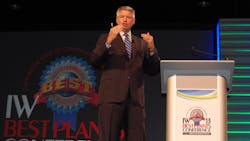"It's not difficult to manufacture tires," Pete Selleck, president and chairman of Michelin North America noted during his keynote address at the IW Best Plants conference on Tuesday.
"What is difficult is to consistently manufacture great performing tires," he added. "That makes all the difference."
Michelin (IW 1000/160), he explained, has managed to sustain top of class products for over 120 years, leading the industry since the original Michelin brothers began disrupting the industry in France back in 1889.
In that time, it has grown into a $27 billion company producing tires for everything from bicycles to space shuttles under a brand name synonymous with consistent high-performance and durability.
Doing that, he said, has required a deep dedication to quality that penetrates every level of production.
"In our company, we have production people and we have quality people," he explained. "What makes us strong is that at Michelin, the quality people are kings. They are the czars."
At Michelin, putting quality first is far more than a slogan—quality managers maintain absolute control over the output of every tire and every factory.
In his address, Selleck explained that every week in factories all over the world, these quality czars pull out a sample of every dimension of every tire produced and slice them up to dissect and measure their precise inner architectures. If any tire is out of spec, the factory is given 24 hours to re-center the architecture and resume production.
"This puts our manufacturing people under a lot of pressure," he said. "But because we do this, once we launch a tire, we know it will be very consistent over time."
That, he said, is the defining point between Michelin and its competitors.
"Our competitors make some very good tires," he explained. "But they also make some that aren't quite so good. The problem for the consumers is, when you buy their tires, you don't know which one you're getting."
Because of Michelin's vigorous quality program and its production staff trained to halt production for any process issue, he said, the company has managed to produce a suite of products that will perform with consistent quality.
And that, he said, is absolutely critical to the customers.
A Brand of Quality
"When you buy a Michelin tire, you pay a significant premium," Selleck explained. "People will pay about 10% to 20% more for a Michelin tire, whether it's for a truck or a car."
According to Michelin's internal research Selleck shared in the presentation, the reason customers are willing to pay that premium is split, with about 25% claiming they pay for the extended tread life and another 25% split between the combination of fuel economy and retreadability.
The other half, Selleck said, is simply because it is a brand they can trust.
"It's brand image," he explained. "There is tremendous value to the perception of trust—customers don't want to worry about the products they buy; they want it to be trouble free. We can offer them that."
And that is why the company dedicates so much time to quality.
"We track this very closely. We have an incredible process for capturing tires that have problems before they can enter the market place. That way we have a lot fewer problems, particularly severe problems like rapid air deflation," he said.
"It's a matter of consistency in quality products and service," he added. "Our customers count on us for that."
For validation of his point, he highlighted the industry records for JD Power awards for tire manufacturers.
Combined, Michelin's eight leading competitors have accumulated 17 awards, which are based on customer responses to purchased products.
Alone, Michelin has earned 72.
"This is proof that process control in our industry is key," Selleck said. "We all use the same equipment to make tires, so we know it's not the equipment that makes the difference. It's the interface between the equipment, the material and the person—the training and the qualification of the person—that makes the difference."
About the Author
Travis M. Hessman
Editor-in-Chief
Travis Hessman is the editor-in-chief and senior content director for IndustryWeek and New Equipment Digest. He began his career as an intern at IndustryWeek in 2001 and later served as IW's technology and innovation editor. Today, he combines his experience as an educator, a writer, and a journalist to help address some of the most significant challenges in the manufacturing industry, with a particular focus on leadership, training, and the technologies of smart manufacturing.
